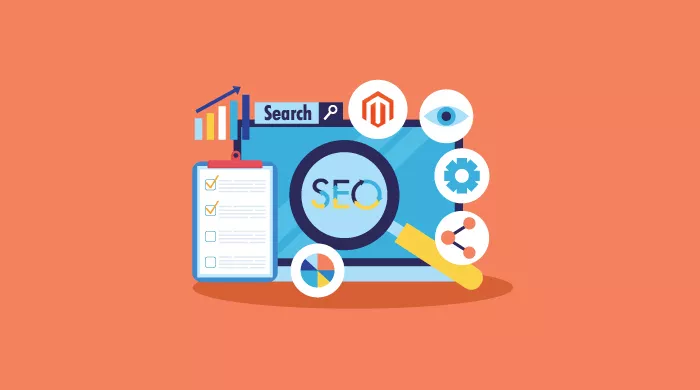In the fast forward world of Ecommerce, choosing the right platform to host your business is a pivotal decision. Tobias Lutke was onto something brilliant when he said, “Ecommerce is not an industry, E-commerce is a tactic.”
So in this brilliantly fierce industry that is a boon to small and medium sized businesses, and a stepping stone for large enterprises to take their brands to the next level, which ecommerce platform will you choose to be your partner in success?
Two very prominent contenders in this arena are Magento and Shopify. Each of these offers a mix of varied features and benefits that is tailored to suit different needs of different businesses. Having to choose between two giants of the ecommerce industry can surely be a daunting task, and that is exactly why we have prepared this comparison guide.
In this article we will explore the key differences between Magento and Shopify to help you decide which platform would suit your business the best.

Understanding Your Business Needs
While the primary goal of every business is to maximize profits and minimize costs, they are not the sole reason why entrepreneurs start their businesses or even why they choose to grow their brand.
Many new entrepreneurs turn to eCommerce because it allows them to enter the vibrant online marketplace without bearing the costs of maintaining a physical storefront. While others use ecommerce as a means to gain more customers and extend the reach of their brand beyond geographical boundaries.
Similarly, different businesses can have different goals as to why they hire ecommerce development companies to help them create the perfect ecommerce website for their business. Depending on the size of your business, industry, budget, and future plans of growth or expansion, your choice of the perfect ecommerce development platform could change. Therefore, it is important to understand the needs and requirements of your business before choosing an ecommerce development platform like Magento or Shopify.
Sounds like a lot of work right? Don’t worry, we are here to simplify this process for you. To begin with, let’s have a look at what exactly these two ecommerce platforms signify.
Magento: Overview and Key Features
Magento is an open-source ecommerce development platform, much like Wordpress, written in PHP, which helps programmers build ecommerce websites for enterprises. It is free to install, but you will have to pay for web hosting, apps, extensions, and security.
Magento was first launched in 2008 by Roy Rubin and Yoav Kutner and was acquired by Adobe in 2018 for a whopping $1.68 billion. It is currently known as Adobe commerce. It is prominently known for being a powerful ecommerce platform used mostly by big enterprises who hire magento developers or have in-house web development teams as it requires you to code.
Key Features:
- Customization: Magento offers extensive customization capabilities, allowing you to tailor your online store and its content to your exact requirements.
- Scalability: It can easily accommodate businesses of all sizes. Although it is mostly favoured by big enterprises, it can host startups and SME’s with ease.
- SEO-Friendly: Magento provides a plethora of built-in SEO tools that can be used to boost your ecommerce website's rank in search engine results.
- Large Community: Magento has a large and vibrant community of developers and users that ensure support and information regarding all extensions and plugins.
Shopify: Overview and Key Features
Easily one of the biggest ecommerce platforms in the world, Shopify is an easy-to-use solution, solely created for building online stores aka ecommerce websites. From an independent boutique to one of the largest brands in the world, Shopify can easily cater to all types and sizes of businesses.
Shopify was founded in 2006 by Tobias Lütke, Daniel Weinand, and Scott Lake. It is a little known fact that before becoming a platform to build online stores, Shopify itself was an online store that sold snowboards.
Prominently known as the go-to option for young and budding entrepreneurs, unlike Magento, Shopify is a paid platform. It charges a monthly payment for providing users with a wide range of themes, apps, and 24/7 support.
Key Features:
- Easy To Use: Shopify has a very user-friendly interface that makes setting up and managing your store a breeze right from the beginning.
- Hosting Included: In Shopify, website hosting is taken care of, eliminating the need for server management from the user’s side.
- App Ecosystem: The Shopify app store offers users a wide range of apps and plugins to extend functionality and features of their ecommerce store.
- Scalability: While it's ideal for small to medium-sized businesses, businesses can purchase Shopify Plus, which caters to enterprise-level needs.
Given the above overview of both the ecommerce platforms, Magento and Shopify, it is easy to tell that while Magento is for businesses that have access to skilled resources (ecommerce developers), Shopify is ideal for businesses that are just starting and looking for a hassle-free experience.

Let’s move on to the next step, weighing the pros and cons of the two ecommerce platforms to check which fits better within your business requirements.
The Pros and Cons: Magento vs. Shopify


Although these are not all the pros and cons of these two platforms, these are a few major ones that will surely affect your decision to host your website on one of the other platforms.
Cost Comparison: Magento vs. Shopify
Now that you have read the pros and cons of each platform, Magento and Shopify, it is time to move on to the most important part of the comparison between them, the cost comparison.
As repeatedly mentioned, Shopify is a paid platform, and that might make you think it is more expensive than Magento, but let’s put a break on that for a while. While it is true that Magento is open-source and free to install, the catch lies in the fact that you need an external provider, like SiteGround, to run Magento, which is estimated to cost anywhere between $10-$30 a month.
Apart from that, here is a basic breakdown of the costs for both Shopify and Magento:

In addition to this, Shopify also offers Shopify Plus, which is aimed at large scale enterprises, and Shopify Lite which is another affordable solution for small businesses. As Shopify is a hosted platform, you need not worry about the extra costs associated with domain, security, and web hosting with it, while these are some things that you do need to pay for in Magento.
This is why you shouldn’t judge a book by its cover, while the free installation of Magento may seem like a cheaper solution than the monthly subscription cost of Shopify, here we are able to see the hidden costs of the platform, not to mention the cost of hiring magento developers.
Verdict: Shopify wins this round. It seems to be the more affordable solution of the two as magento is recommended for enterprise level businesses with a strong customer base.
User Experience and Ease of Use: Magento vs. Shopify
As the business owner, you are the primary user of the ecommerce platform. If you pick a platform that is too difficult to even set up, then you are only setting yourself up for more trouble in the future.
You need to choose a platform that you can customize easily, otherwise you will not be able to create the store from your vision and end up disappointing your customers and damaging your brand reputation.
It is a fact that Shopify is easier to use than Magento. The drag and drop features of the website builder in Shopify allow you to customize the storepage features as you like without requiring complex coding. Therefore, we can easily conclude that while Shopify is easy to use for people even without a technical background, Magento is only suitable for web developers.
Verdict: Shopify is the one-stop-shop solution for budding entrepreneurs without a background in coding or technical abilities. While Magento, being more customizable, is suitable for web developers who can customize their site as per their requirements.
Themes: Magento vs. Shopify
The theme and design of the website are the first things that a user/ customer registers when they enter your website and it is also one of the prime reasons why they exit the website quickly if they find it unsuitable.
With that being said, first impressions matter a lot to online customers, you need to choose your theme and site template very carefully. Shopify offers its users 10 free and 64 premium themes costing between $140-$180. Another important factor to note is that all its themes are mobile friendly. With more and more customers using their smartphones to shop, this is a game-changing anecdote that you need to consider.

Magento also offers users ready-made themes that on an average can cost $100, but since the platform is known for its highly customizable themes, those can cost anywhere from $600-$25000.
Verdict: Shopify has a wider and more cost-friendly range of themes that SMEs can use. However, if you want a highly customized website and have the capital resources for it then you can always go for Magento instead.
Marketing Features and Sales Tools: Magento vs. Shopify
With powerful marketing tools you can take your business to the next level very easily. Who doesn’t like that? And Shopify gives you just the right marketing features and sales tools to seal the deal.
Shopify not only offers you multi-channel sales on Facebook, Instagram, Amazon, etc, but also has partnerships with courier service providers like USPS, DHL, UPS, etc to help you avoid the hassle of finding your own courier service.
But don’t worry, Magento also has extensions through which you can implement multi-channel selling for your business and it also allows you to create your own customized checkout, so it doesn’t lag behind Shopify much in this area.
However, you need to remember that while Shopify has all these features built into it, you need to install extensive extensions in order to have the same functionality in Magento.
Verdict: Shopify wins this one too. Marketing is a very significant part of operating a business, therefore the advantage of a wider more easily accessible range of features cannot be taken for granted here.
SEO: Magento vs. Shopify
You cannot ignore SEO (search engine optimization) when you are talking about online business. SEO is essential to increase the traffic on your website from search engines as it directly translates to getting more customers and earning more money.
Magento has an edge over Shopify in this category. While Magento excels in SEO with its multiple guides and prompts, Shopify is dependent on its apps for SEO. In Magento you can edit the Alt tags for your images and also change the URL of your website through its built in features which ultimately helps your website rank higher on SERPs.
With Shopify you’ll need to install more apps for improving your site SEO.
Verdict: Magento wins this category over Shopify with its built in features for a superior SEO ability.
Payment and Security Features: Magento vs. Shopify
The role of payment processors is quite big in any online transaction. Thankfully, both platforms are quite secure and good at connecting the payment processors with your store for a smooth transaction.
Shopify has its own payment processor called Shopify payments, which is excellent for the users as it imposes zero transaction fees (except the credit card processing fee). However, it does charge a payment processing fee if you are not using Shopify Payments and instead using a payment gateway. It supports over a 100 payment gateways including the most popular ones like Paypal, Amazon Pay, Apple Pay, etc.

Here is a quick overview of the transaction processing fee for different Shopify plans:
|
Shopify Basic |
Shopify |
Shopify Advanced |
|
2.9% + 30¢ per transaction |
2.6% + 30 ¢ per transaction |
2.4% + 30¢ per transaction |
Magento supports more than 150 payment gateways but a majority of those are directed at large enterprise transactions such as WorldPay. However, it does allow you to directly sell through Amazon, while using your Magento based inventory.
Verdict: Magento is a clear winner here since Shopify comes off as a little restrictive and costly if you are not using Shopify payments.
Community and Support: Magento vs. Shopify
As is the case with every bit of technology, there will be times when it breaks down. Here the winner is one where you can quickly access help and support to fix the issue and get back on your feet to start doing your business again.
Thankfully, both our platforms are well rounded in the help and support category. Shopify has a well-rounded and large community of users which makes it easy for users to seek information and help regarding issues. It also has these support features:
- 24/7 phone support
- Social media support
- Community forum
- Email support
- Help center
- Video tutorials
- Advanced specialist support
On the other hand, Magento being a more complex to operate platform has its own user guides and as a user-community based platform, it has more step-by-step instructions available to help build your online store. Additionally, users will also have access to the help and support team of SiteGround for whichever issues they are facing.
Verdict: While Shopify does have a good support team, Magento wins this one with professional web developers and their technical expertise.
Now that we are nearing the end of this comparison guide, I hope that by now you have a clear understanding of which platform is more suitable for the size, scale, industry, and budget of your business. If not, let’s have a look at the quick summary to clear things up more.
Magento vs. Shopify: A Summary
Magento is used by over 709 thousand shops worldwide, while Shopify is favored by more than 6.9 million shops globally. Just from this simple statistic it is clear that Shopify is the more user-friendly platform out of the two. But being user-friendly doesn’t automatically equate to being the right choice for your business.
Go for Shopify if:
- You are a first time business owner with little to no technical knowledge and background.
- You need to set up your online business faster, and for a limited audience at the beginning.
- You have a lower budget for your business.
Go for Magento if:
- You have the resource to hire magento developers or have an in-house development team.
- Have the time and resources to sustain a long-term development project since customizing projects takes more time.
- Have good capital resources and a strong customer base.








